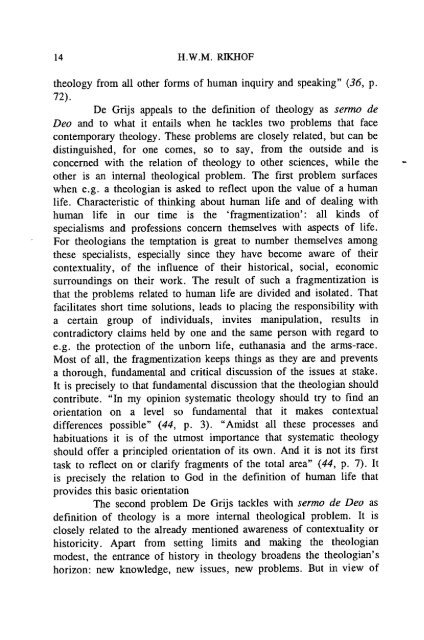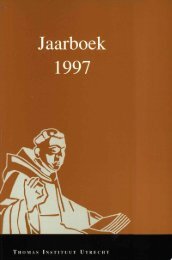Jaarboek Thomas Instituut 1995 - Thomas Instituut te Utrecht
Jaarboek Thomas Instituut 1995 - Thomas Instituut te Utrecht
Jaarboek Thomas Instituut 1995 - Thomas Instituut te Utrecht
You also want an ePaper? Increase the reach of your titles
YUMPU automatically turns print PDFs into web optimized ePapers that Google loves.
14 H.W.M. RIKHOF<br />
theology from all other forms of human inquiry and speaking" (36, p.<br />
72).<br />
De Grijs appeals to the definition of theology as sermo de<br />
Deo and to what it entails when he tackles two problems that face<br />
con<strong>te</strong>mporary theology. These problems are closely rela<strong>te</strong>d, but can be<br />
distinguished, for one comes, so to say, from the outside and is<br />
concerned with the relation of theology to other sciences, while the<br />
other is an in<strong>te</strong>rnal theological problem. The first problem surfaces<br />
when e.g. a theologian is asked to reflect upon the value of a human<br />
life. Charac<strong>te</strong>ristic of thinking about human life and of dealing with<br />
human life in our time is the 'fragmentization': all kinds of<br />
specialisms and professions concern themselves with aspects of life.<br />
For theologians the <strong>te</strong>mptation is great to number themselves among<br />
these specialists, especially since they have become aware of their<br />
con<strong>te</strong>xtuality, of the influence of their historical, social, economic<br />
surroundings on their work. The result of such a fragmentization is<br />
that the problems rela<strong>te</strong>d to human life are divided and isola<strong>te</strong>d. That<br />
facilita<strong>te</strong>s short time solutions, leads to placing the responsibility with<br />
a certain group of individuals, invi<strong>te</strong>s manipulation, results in<br />
contradictory claims held by one and the same person with regard to<br />
e.g. the pro<strong>te</strong>ction of the unborn life, euthanasia and the arms-race.<br />
Most of all, the fragmentization keeps things as they are and prevents<br />
a thorough, fundamental and critical discussion of the issues at stake.<br />
It is precisely to that fundamental discussion that the theologian should<br />
contribu<strong>te</strong>. "In my opinion sys<strong>te</strong>matic theology should try to find an<br />
orientation on a level so fundamental that it makes con<strong>te</strong>xtual<br />
differences possible" (44, p. 3). "Amidst all these processes and<br />
habituations it is of the utmost importance that sys<strong>te</strong>matic theology<br />
should offer a principled orientation of its own. And it is not its first<br />
task to reflect on or clarify fragments of the total area" (44, p. 7). It<br />
is precisely the relation to God in the definition of human life that<br />
provides this basic orientation<br />
The second problem De Grijs tackles with sermo de Deo as<br />
definition of theology is a more in<strong>te</strong>rnal theological problem. It is<br />
closely rela<strong>te</strong>d to the already mentioned awareness of con<strong>te</strong>xtuality or<br />
historicity. Apart from setting limits and making the theologian<br />
modest, the entrance of history in theology broadens the theologian's<br />
horizon: new knowledge, new issues, new problems. But in view of








